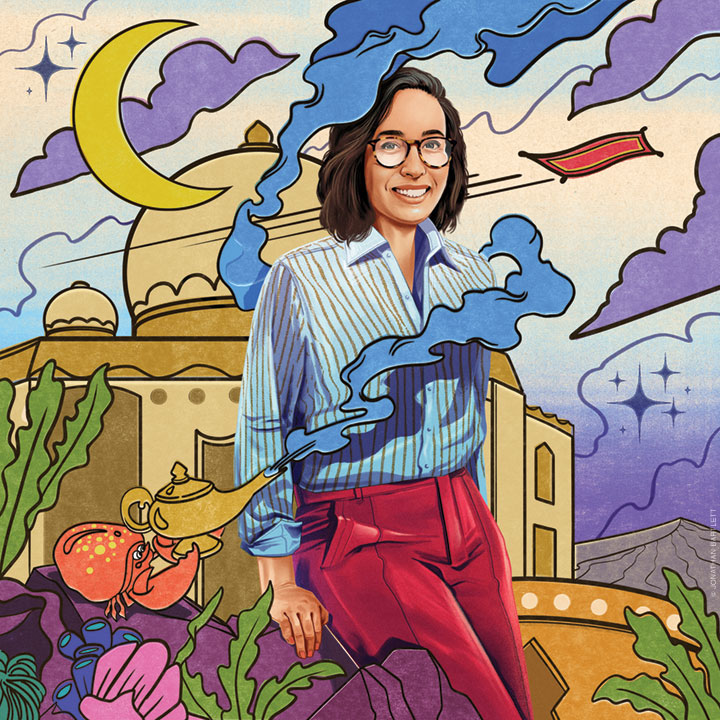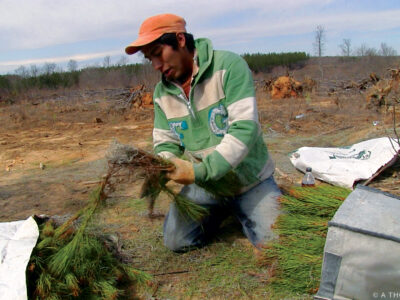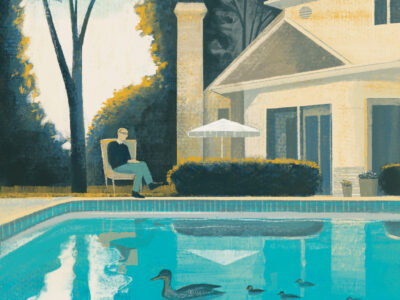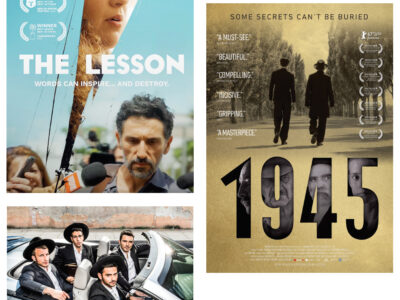
This Disney exec is helping to modernize and upgrade classic films.
The ending of Disney’s animated movie Aladdin, released in 1992, is familiar to many families. The Sultan of Agrabah finally comes to his senses and decrees that his daughter, Princess Jasmine, should be able to marry whomever she wants. (In her case, Aladdin.) “From this day forth, the princess shall marry whomever she deems worthy,” he declares, waving his hands in a show of power and enthusiasm.
Fast forward to the spring of 2019 when Disney released a remake of its classic, this time with human actors. The ending changed in a subtle but important way. “You shall be the next sultan,” said Jasmine’s dad, handing her the almighty ring. “As sultan, you may change the law.” The message: a woman doesn’t have to wait for a man to change her life; she can rise to power and make changes herself.
Tweaking the plot of a beloved Disney movie is a big deal, and one of the key people involved in making the decision was Allison Erlikhman C’09. As a vice president of production at Walt Disney Studios, her job is to oversee all parts of the development of a movie from screening submissions, supervising script development, recruiting writers and directors, and working on the shooting. As she puts it: “You are the spoke of the wheel for the organization.”
During her six-plus years at Disney, she has helped modernize the company by bringing in female and minority talent to be writers, producers, and directors. For example, she tapped Lena Khan, a Muslim woman, to direct Flora & Ulysses, and Wanuri Kahiu, a Kenyan film producer and director, to oversee Once on This Island.
She’s also tried to ensure that movie scripts and plots are empowering to female and minority children. She’s currently working on a version of the Pirates of the Caribbean where the fierce and brave pirates are women. There’s also the upcoming live-action remake of The Little Mermaid in which Ariel—a white character with long, red hair in the animated original—will be played by Halle Bailey, a Black actress. And she was part of the team that transformed Princess Jasmine into a sultan—“one of the things I am most proud of,” she says.
These changes are important, explains Andrea Lee Press, a professor of media studies and sociology at the University of Virginia who writes about feminism in the media. “Disney films are the most popular films that young people watch in our culture, and they watch them over and over and over again,” she says. “The role models kids see in these movies form their beliefs as much as anything else.”
When she was growing up in Los Angeles, Erlikhman’s parents enrolled her in acting classes after school and on weekends. “I realized I didn’t want to be an actor,” she says, “but I liked everything else that went along with it.” At Harvard-Westlake School, she directed and produced plays like South Pacific and How to Succeed in Business Without Really Trying.
At Penn, where she was a psychology major, she spent most of her evenings at the Platt Student Performing Arts House, working on productions. Sometimes she was the director, a role that included casting the performance, approving costumes, and staging scenes. Other times she was the producer, which involved managing the budget and making sure the team worked together. She estimates she pulled off about 20 shows at Penn. “Before every one, we flyered on Locust Walk,” she says. “It was like a rite of passage, trying to convince other students to see your show. We never played to an empty house though.”
During college, she also got her start working on movies, first interning with famed producer Marc Platt C’79 and then at the production company Sidney Kimmel Entertainment. Her task was to read scripts, summarize them, and provide feedback, a process she likens to writing a book report. After college she moved back to Los Angeles, where she landed a gig at Columbia Pictures before moving to Disney.
At any given moment, Erlikhman says, she’s working on 20 to 25 movies that are in various stages of development. “We like to juggle a lot to make sure we have plenty in the pipeline,” she notes. “Sometimes the script doesn’t get to where you need it to be or a movie doesn’t get made for another reason.” The launch of Disney+ in November 2019 has only increased demand for content—which for Erlikhman, means more opportunities to bring in female voices and diversify what’s being streamed into viewers’ homes. “Disney now has this even greater opportunity to reach people,” she says. “We make mass media. What is in our movies reaches everyone. We have the opportunity to expose people to things they might not be familiar with. If we do our jobs right ,we can impact the world.”
Updating—but not overhauling—Disney classics can be a tricky balancing act. A movie like Aladdin is now seen as offensive by some for its depictions of Arab culture, while the female protagonists from the original Snow White in 1937 to The Little Mermaid in 1989 often lack agency or make sacrifices for men. “From a feminist perspective, Little Mermaid was a really terrifying story of a woman giving up her voice,” says Press. But these movies, even with their flaws, are so beloved that children of all ages still watch them today and find magic in them. “We can’t throw them out altogether,” Press adds. “They are ubiquitous. That would be impossible.”
For now, Disney’s plan seems to be to keep the overall plots the same but make small but powerful changes. In the live-action version of Beauty and the Beast, for example, instead of crying when she is locked in the castle, Belle actively tries to escape. In the live-action Mulan remake, the main character never cuts off her hair, only putting it up in a bun when she pretends to be a man. When she discovers her strength, she lets her long hair flow, embracing who she really is.
“Remakes present a whole different set of challenges than making a new movie,” Erlikhman says. “We want to make sure we are delivering movies that feel like the movies audiences love, but we want them to feel modern and of the time they come out.”
—Alyson Krueger C’07




